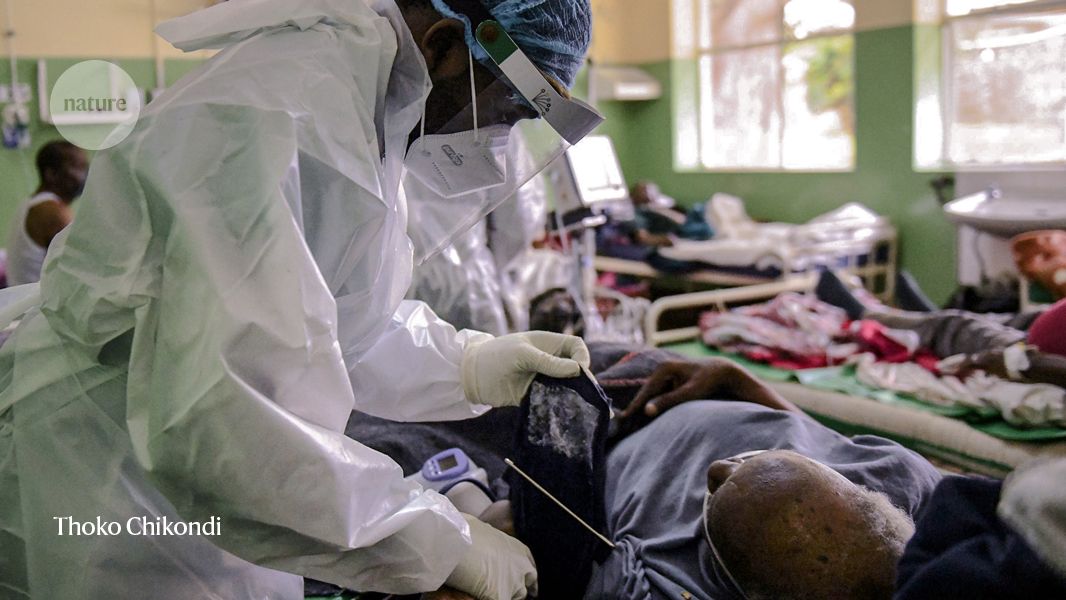Sources: Our World in Data (SARS-CoV-2 and HIV)/UNICEF (H. influenzae and S. pneumoniae; see https://go.nature.com/3NMTQNJ)
Masiku wasn’t alone. Predicting the unfair distribution of COVID-19 vaccines, South Africa and India put forward a proposal to waive TRIPS in October 2020. In the following months, many countries and international organizations, including the United States and the WHO, backed a waiver. But the proposal languished at the WTO for around 20 months, with the European Union and others blocking the measure. Opponents argued that it would undermine innovation and do little to fill the gap in vaccine supplies. On 17 June this year, the WTO passed a heavily revised version of the waiver that offers a temporary relief on some restrictions. The deal was widely criticized as too compromised to make a difference to most manufacturers in the global south, including the companies involved with the WHO’s mRNA hub.
In the meantime, the WHO has continued to press Moderna to license its IP to the hub, or at least share its data, such as the details of clinical trials, that could help Afrigen to confirm that its vaccine candidate meets similar metrics. On 28 April, Tedros made a case for these measures at a meeting with Moderna’s shareholders, saying that the hub could have a vaccine ready one year earlier if Moderna worked with them. Since then, nearly 30% of Moderna’s shareholders, including its directors and senior executives, have endorsed this plea, according to the non-profit organization Oxfam, based in Nairobi, Kenya, which submitted the resolution to Moderna. But the company seems to be moving in the opposite direction — in ways that might undermine the hub’s work.
Soon after Afrigen announced that it would attempt to make a Moderna-like vaccine, Moderna obtained several vaccine patents in South Africa that won’t expire until 2034. One of the claims, which covers the method of mRNA vaccine production broadly, was rejected or withdrawn in Canada, Israel, Singapore and South Korea. This patent could potentially frustrate the hub’s attempts to make and sell mRNA vaccines for any disease, says Zain Rizvi, a researcher specializing in access to medicines at the advocacy organization Public Citizen, based in Washington DC. Such actions have drawn condemnation from researchers who see them as an abuse of a patent system designed to reward companies fairly for their investment into research and development. Moderna’s private investments have been more than paid off, because its costs were offset by public funding, according to a Public Citizen report. Much of the foundational work on mRNA vaccines was conducted at universities and at the NIH, and the US government gave the company roughly US$1 billion to underwrite its clinical trials. Moderna subsequently reported $18 billion in total revenue in 2021 and has forecast $19 billion this year. Thanks to its vaccine sales, two Moderna founders and one investor are newly minted billionaires.
“It is really hard to watch the profiteering we have seen in the middle of the pandemic,” says Larry Brilliant, an epidemiologist who helped to eradicate smallpox through vaccination campaigns. “I don’t think history will be kind to those who had life-saving interventions and made the decision to maximize profit instead.”
Moderna did not respond to requests from Nature for comment. But in an interview with The Wall Street Journal, Moderna’s chief executive Stéphane Bancel said that the company won’t impede Afrigen’s work in South Africa; he made no mention of the 15 larger companies working with the hub. He added, “I don’t understand why, once we’re in an endemic setting when there’s plenty of vaccine and there’s no issue to supply vaccines, why we should not get rewarded for the things we invented.”
Uncertain about Moderna’s position, Afrigen announced a collaboration with the NIH on the development of next-generation mRNA vaccines and therapeutics on 8 July, and Terblanche is discussing potential partnerships with six biotechnology companies. Meanwhile, academic researchers affiliated with the hub are exploring different mRNA sequences and lipids that might make Afrigen’s vaccine candidate sufficiently distinct from Moderna’s. “It’s like reinventing the wheel,” confesses Abdullah Ely, a molecular biologist at the University of the Witwatersrand in Johannesburg, South Africa.
Despite the hub’s efforts, next-generation mRNA vaccines might still be entangled in patent thickets if some components of the technology have been claimed by others. An astounding number of patents — estimated at more than 80 — surround the mRNA vaccines, according to one analysis5. A thorny IP landscape isn’t as daunting for big companies with the capital to litigate, explains Tahir Amin, a lawyer and co-founder of the Initiative for Medicines, Access & Knowledge (I-MAK), a non-profit group based in New York City. Amin says that the hub could boldly move forward, too, and harness public condemnation if Moderna or other companies file a lawsuit. But this option is off the table because the Medicines Patent Pool vows not to infringe on patents. Indeed, the agency’s model relies on persuading pharmaceutical companies to voluntarily license their technologies to alternative manufacturers, often in exchange for royalty fees.
Recalling the years of fighting required to get HIV drugs to southern Africa, Fatima Hassan, a human-rights lawyer who now heads the Health Justice Initiative in Cape Town, predicts that this cautious approach could backfire. She says that radical policy changes, such as government action to override patent barriers, could be required for the hub to succeed. And she worries that the WHO and the Medicines Patent Pool won’t push back hard enough against Moderna if it back-pedals on its promises not to interfere with the hub’s work. Sitting in a windswept park beside the Atlantic Ocean in Cape Town, Hassan raises her voice to ask, “What is the plan B?”






More News
Could bird flu in cows lead to a human outbreak? Slow response worries scientists
US halts funding to controversial virus-hunting group: what researchers think
How high-fat diets feed breast cancer